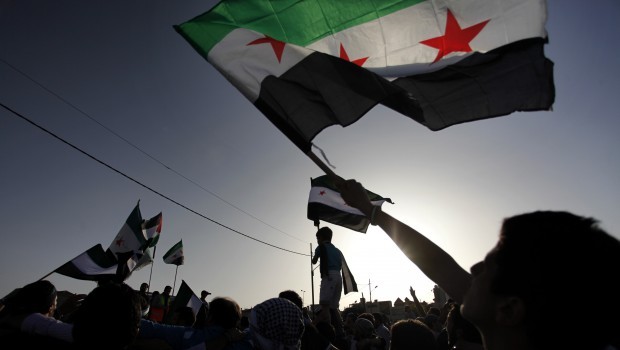Soon after the rise of the Justice and Development Party (AKP) in 2002, Turkey launched an ambitious foreign policy agenda to make itself a stand-alone regional leader. With this new vision, Turkey looked to cast itself as a central actor, wielding soft power to shape the Middle East.
The Syrian war and Iran’s regional hegemonic designs have, unfortunately, stunted most of Ankara’s ambitions.
AKP’s mind-set around 2002 was that Ankara had played second fiddle to Washington for too long in the Middle East. Turkey could become a regional power only if it stood alone in the region, dissenting with US policy when and if needed. This sentiment rose to the surface during the lead-up to the Iraq war, and bestowed legitimacy upon the new Turkish regime in the eyes of the peoples of the region. Along the same lines, AKP elites envisioned making Turkey a soft power in the Middle East, hoping to shape the region through the country’s cultural, social, and economic influence.
Thanks to Turkey’s meteoric economic rise over the past decade, the second part of that vision has been, for the most part, fulfilled. Turkey today is the Middle East’s dominant economy; surpassing runners-up Iran and Saudi Arabia by a wide margin. Turkish businesses are rising in the Middle East, and Turkish cultural products, from television programs to schools, are in demand across the region.
But, Turkey’s plan to be a stand-alone power in the region is nowhere near fruition. The war in Syria has forced Ankara to revise this policy, and this has meant re-appraising the value of ties with the United States. Since 2011, Ankara has moved close to the United States, looking for shelter once again under the NATO umbrella.
In late 2011, hoping to help oust the Assad regime, Turkey began to host and arm the Syrian opposition. But, thus far, this policy has not borne results. Even if the Syrian rebels have made some gains, Assad and his supporters appear likely to continue to hold onto parts of Syria. Accordingly, instead of a speedy collapse of the Assad regime, Turkey now faces the prospects of a weak and divided state next door.
This has created a security challenge more complex than any Ankara has faced. And the United States will be an indispensable ally helping the Turks to cope. Ankara now wants to work closely with Washington in order to shield itself from the instability of the Syrian War. The gambit of grim scenarios runs from proliferation of chemical weapons next door to state collapse across from Turkey’s longest border.
Another Syria-related factor that drives Ankara’s rapprochement with Washington is Turkey’s proxy war against Iran in Syria. If Ankara fails to secure U.S. assistance against the Assad regime, Ankara could lose this war. Iran has thrown its full support behind the Assad regime, and has ably undermined Ankara’s policy of regime change in Damascus.
In Iraq, too, Iran is Ankara’s main competitor. Ankara supported the secular and pan-Iraqi Allawi block in the 2010 Iraqi elections. However, Allawi lost the elections to Nuri Al-Maliki, who Ankara considers “Iran’s man in Baghdad.” This has created a fissure between Ankara and Baghdad, as well as between Ankara and Tehran. In return, Ankara has built intimate ties with Iraq’s Sunni north, bringing the Kurds, Arabs, and Turkmen there into its fold to counter Maliki and Tehran’s influence in Baghdad. In today’s Iraq, the widespread perception is that Turkey and Iraq’s Sunnis are facing off against Iran and Iraq’s Shi’ites.
By this logic, Turkey (as well as Qatar and Saudi Arabia) is backing Sunni rebels in the fight against a coalition of Iranian-supported Shi’ite forces in Syria. The latter is comprised of Iranians, as well as Iraqi and Lebanese Shi’ites, and last but not least the country’s Alawite minority. An alignment of revolutionary Iran and the Syrian Alawites has been in formation since the 1970s, as evidenced by Ayatollah Hasan Mahdi Al-Shirazi and Musa Al-Sadr’s issuance of fatwas arguing that Alawites are members of the Shi’ite sect.
Pulled into this sectarian quagmire, Turkey has tempered its stand-alone foreign policy ambitions. But considerable damage has already been done, as sectarian flames start to melt away Turkey’s hard-earned soft power in parts of the region.
Last but not least, the sharpening sectarian divide in the region is pitting Iran and Turkey against each other in ways not seen since the period between the 15th and 17th centuries when the Ottomans and Persians fought a 166 year war for influence in the Middle East.

Nowhere in the world wherein Muslims are not in a big turmoil, unrest, Shia-Sunni conflict, and demonstration have been indispensable part of our lives, we have been disunited in different sects & political groups, we have kept the message of the Holey Quran aside despite it the Holey Quran makes us assure our success in unity as mentioned in it “وَاعْتَصِمُوۡ ا بِحَبْلِ اللهِ جَمِيعا
وَّ لَا تَفَرَّقُوۡا And hold fast all of you together to the rope of Allah, and be no divided among yourselves, that’s why we are rejected every where, even the door of Arsh has been closed for the people like us, we must ponder over these emerging issues and sort out the effective solution to these problems, the leader of Islamic world must take initiatives to confront the abhorrent situation that is weakening our financial, and moral structures.
Please take into your consideration as soon as possible